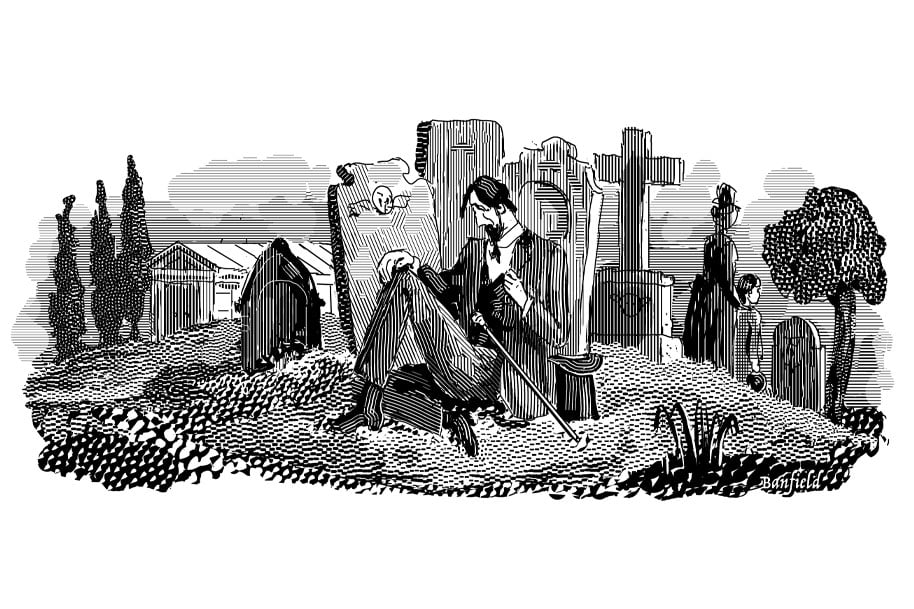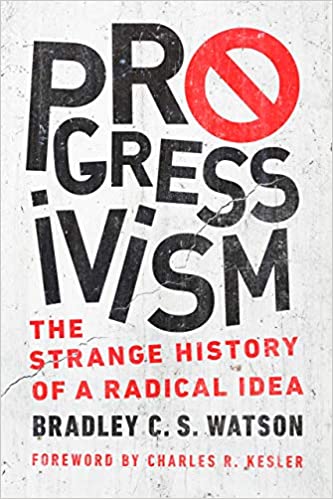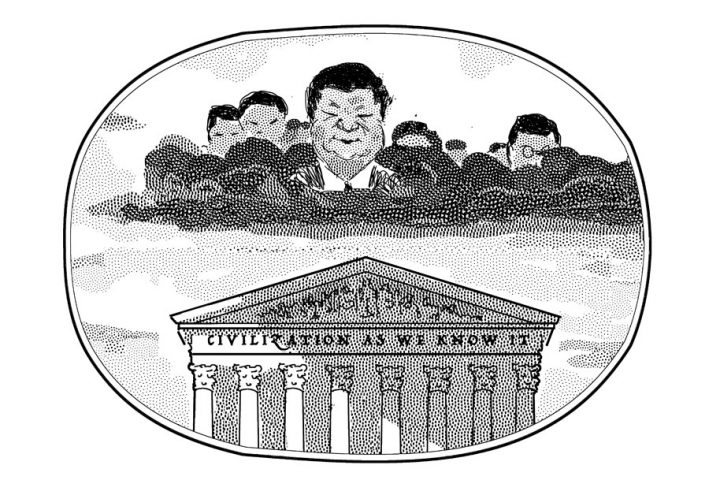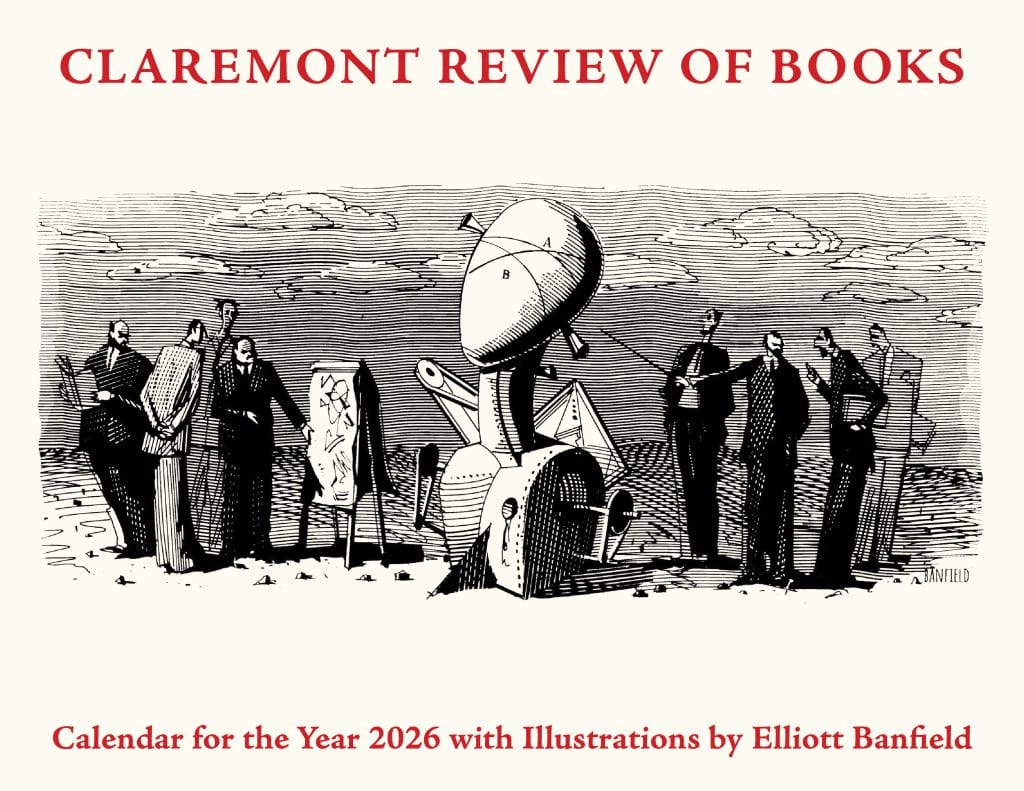Books Reviewed
Progressivism, in its original 19th-century form, was the offspring of pessimism. Part of that pessimism was a revulsion at what the Civil War had done and, more to the point, failed to do. It had taken an America whose driving intellectual forces were enthusiastically religious, artistically naïve, and absolute in their moral self-confidence, and plunged it into a four-year bloodbath led by incompetent generals, pockmarked by genocidal massacres (as at Fort Pillow and the Crater), and frothing with stupidity, greed, and fraud. Overall, approximately one out of every ten white American males of military age in 1860 was dead by 1865 from some war-related cause. Even after the war, the federal government would be paying pensions to nearly one million Union veterans or their dependents, at a total cost (by 1900) of almost 22% of all federal expenditures.
And for what? Emancipation, yes. Union, yes. But the promise that emancipation would produce an egalitarian, biracial society was cruelly smashed by the failures of Reconstruction, and reunion only resulted by the 1880s in a revival of the same old alliance of corrupt Northern Democrats and white-hooded Southern Democrats that had brought the country to the brink of war in the first place. Oliver Wendell Holmes went into the war a Boston Brahmin idealist, convinced that it was “the Christian Crusade of the 19th century.” By 1864, he was “not the same man” he had been three years prior and warned his family that he “may not have quite the same ideas” and “will not acknowledge the same claims upon me under those circumstances that existed formerly” (emphasis in the original). Years later, he would tell the diplomat Lewis Einstein “that after the Civil War the world never seemed quite right again.”
* * *
The sheer volume of destruction, human and economic, unhinged something in the American mind and left it ill-prepared to receive a second shock: the publication of Charles Darwin’s The Origin of Species. Although it was first released in Britain in 1859, the Civil War delayed its full impact in America until after Appomattox. But when it finally was read, it seemed the perfect explanation of the pointlessness of the Civil War, since the book portrayed physical existence itself as a pointless, directionless evolution, by means of “natural selection,” from nothing in particular to nothing in particular. “The great word Evolution,” wrote Henry Adams (whose brother had served in the Union army and whose father was President Lincoln’s diplomatic envoy to Great Britain) was exactly the thing to describe the purposelessness and randomness he had seen during the war and in the war’s results. “Such a working system for the universe suited a young man who had just helped to waste five or ten thousand million dollars and a million lives, more or less, to enforce unity and uniformity on people who objected to it; the idea was only too seductive in its perfection; it had the charm of art.”
In the new Darwinian universe, ideas were biological mechanisms. They did not convey truth; they were tools to assist one’s adaptation to the relentless organic processes of natural selection. In postwar Cambridge, Massachusetts, Holmes and a coterie of budding philosophers that included Charles Sanders Peirce and William James (two of whose brothers had been wrecked by their experiences in the war) formulated a new epistemology which taught that belief was not really what minds experience when they encounter truth. Rather, belief is something which “appeases the irritation of doubt” or which acts as “a rule for action.” Why, Peirce asked, do we think? (And here, the reduction of thinking to a tool for Darwinian survival showed itself.) We think in order “to produce habits of action.” This was what Peirce called “pragmatism.” But it remained for William James to give pragmatism its most elegant and memorable form, as “a class-name for all sorts of definite working-values in experience,” for “what works best.” Truth is not “a stagnant property inherent in” an idea; an idea “becomes true, is made true by events.”
The thread running through Holmes, Adams, Peirce, and James was the evaporation of confidence, from disillusion to evolution to pragmatism. That thread pointed them toward the creation of a new American society, a society which had the chastened flexibility of a Darwinian organism rather than the rigidity of abstract truths. Creating that society was what Progressivism promised to do.
* * *
Bradley Watson holds the Philip M. McKenna Chair in American and Western Political Thought at Saint Vincent College in Latrobe, Pennsylvania, where he also directs the college’s Center for Political and Economic Thought. He has vigorously defended the integrity of the Constitution and criticized Progressive encroachments in his book Living Constitution, Dying Faith: Progressivism and the New Science of Jurisprudence (2009). In Progressivism: The Strange History of a Radical Idea, Watson has crafted, not so much a historical genealogy of Progressivism, as its historiography—how American historians have written about Progressivism, from its first historical account in Harold Faulkner’s The Quest for Social Justice, 1898–1914, in 1931. Along the line of Watson’s march appear some of the brightest stars in the firmament of American historical writing (and political-history writing) in the 20th century: Richard Hofstadter, above all, for Social Darwinism in American Thought (1944) and The Age of Reform: From Bryan to F.D.R. (1955), but also Henry Steele Commager, Daniel Boorstin, C. Vann Woodward, David Potter, Louis Hartz, Arthur Link, Gabriel Kolko, Henry F. May, and Robert Wiebe.
That Progressivism attracted so much of these historians’ attention does not surprise Watson, since the emergence of an American historical profession—which means history academics, steeped in academic methodologies, as opposed to literary amateurs of the Francis Parkman or William Hickling Prescott variety—occurred virtually parallel to pragmatism and Progressivism. “[P]rofessional American historians were, in various ways, thoroughly progressive from the get-go,” he writes, largely because the historians shared the infatuation with “[t]he ever-shifting interactions between organism and environment” that characterized Darwin’s evolution—and that became so vital a component of Progressive politics. No longer was history to be understood as the story of how (in Samuel Johnson’s description) “every government…is perpetually degenerating towards corruption” and “must be rescued at certain periods by the resuscitation of its first principles, and the re-establishment of its original constitution.” There no longer were any “first principles” to which anyone could recur; history must become the measure of how external environments forced change and adaptation upon societies. What Johnson deplored as “corruption” was simply a new form of organic development, and there was no more point in resuscitating a society’s “first principles” than there would be in reviving the trilobite or the wooly mammoth. To encounter Progressive politics was, for the new professional historians, love at first sight.
* * *
It was precisely the wide overlap in assumptions shared by Progressivism and its subsequent historians which blinded so many of them to Progressivism’s most fundamental premise, and turned histories of Progressivism into yet another strange case of the dog in the night (who does not bark because he sees no one strange enough to make him bark). Understand, Watson warns us at the outset, that “[t]he progressive idea, simply put, is that the principled American constitutionalism of fixed natural rights and limited and dispersed powers must be overturned and replaced by an organic, evolutionary model of the Constitution that facilitates the authority of experts dedicated to the expansion of the public sphere and political control, especially at the national level.” This fundamental “idea” opened into five major applications: 1) that “there are no fixed or eternal principles that govern,” 2) that “the state and its component parts are organic” and “involved in a struggle for never-ending growth,” 3) that “democratic openness and experimentalism…are the fertilizer of the organic state,” 4) that “the state and its components exist only in History,” and 5) that “some individuals stand outside this process…an elite class, possessed of intelligence as a method” who provide the messianic leadership needed to move the process smoothly along.
That these corollaries flew straight into the face of the American Founders hardly needs explanation. The Declaration appealed to certain “self-evident truths” about human nature and human rights which were the fixed points to which all political construction had to adhere. The Fairfax Resolves of 1774 announced that the claims of “the British Crown” are “totally incompatible with the Privileges of a free People, and the natural rights of mankind,” and the Virginia Declaration of Rights proclaimed that “[a]ll men…have certain inherent natural Rights.” These rights were claimed (said Jefferson) not “under the charters of kings or legislators, but under the King of kings.” And this, argues Watson, was the touchstone of American political thinking straight up through Abraham Lincoln, for whom “the task of great political actors…was to look backward as much as—perhaps more than—forward.”
But after the Civil War, the impact of disillusion, Darwin, and pragmatism tumbled confidence in any such fixed points. In the hands of Progressives, American society became the product either of the frontier experience (as in Frederick Jackson Turner’s “frontier thesis,” which argued that the American character was shaped, not by natural law, but in its struggle with the American environment) or the economic motivations of the founders (as in Charles Beard, who reduced American statesmanship to “interest group politics and financial incentives”). By the time historians began writing about Progressivism itself, any sense that the Progressive mentality might have begun with a philosophical rejection of the founders and their Constitution had evaporated, and the historians of Progressivism described its emergence as if it, too, was some evolution out of a rudderless historical flux.
The historians whom Watson chronicles did not always mean this as a compliment. Henry Steele Commager’s The American Mind (1950) bathed the Progressives in an admiring light, and Commager actually began his narrative of “American Thought and Character” with the Progressives, as though no American ideas had really existed before. His Progressives are pure pragmatists, “tough-minded, competent, and empirical” (adjectives Commager borrowed straight from William James), and their political philosophy was a simple recognition that American times had changed, that “laissez faire” was no way to run an economy, and that the federal government had to be recognized as “a social welfare agency.” The Constitution entered Commager’s account merely as a marker of how “the doctrine of broad construction” had achieved an “unqualified triumph.”
* * *
But others in the ensuing decade were less fond in their retellings. Richard Hofstadter had moved far beyond the Progressives politically (including a brief flirtation with the Communist Party USA in the late ’30s) and in 1955 looked back on them in The Age of Reform as an outburst of middle-class “status anxiety.” Hofstadter saw nothing in the Progressives which looked like an insurgency against the Constitution or the natural law tradition since, for Hofstadter, there was no such tradition, and he approvingly cited Lionel Trilling’s dismissive adage that conservatism in America was merely an assembly of “irritable mental gestures which seek to resemble ideas.” From Hofstadter’s vantage point, Progressivism was actually a conservative movement of its own: it saw that American society at the turn of the 20th century was developing new, unprecedented tensions and forms, and it sought to stave off the radical consequences of those developments by inoculating American life with mild, friendly reforms. Progressivism’s champions were “those intellectuals and professional men” who “shared with other members of the middle classes” a dread of upheaval and “changes in their social position.” The demon which Progressivism thought it had to defang was populism; no genuinely radical break would occur in American politics until the New Deal. The problem with Progressivism was, for Hofstadter, that it really wasn’t about progress at all, but appeasement.
Hofstadter’s contemporaries were even harsher. Daniel Aaron’s Men of Good Hope: A Story of American Progressives (1951) lauded the first wave of Progressivism as a moment of genuine radicalism, ruined by the coddling half-measures proposed by Theodore Roosevelt and Woodrow Wilson. William Appleman Williams, in The Contours of American History (1961) was even more dismissive. The fundamental challenge facing the Progressives was “how to transform a political economy created and dominated by the large corporation into a true social system—a community.” But all they had to offer, Williams snorted, was “ameliorative” capitalism. Worse than that, obsessed by Turner’s frontier thesis, the Progressives sought to preserve the “frontier” virtues lost by the celebrated “closing” of that frontier in 1890 by re-creating new frontiers on other nations’ soil—the Caribbean in the Spanish-American War, Europe in World War I. Imperialism, complained Williams, was the Progressives’ chief gift to America, rather than “a bold approach to a fundamental reorganization of the constitutional and political framework.”
* * *
Inevitably, historians were bound to conclude that Progressivism was itself nothing more than irritable mental gestures—which they did, beginning with Daniel Boorstin’s The Genius of American Politics (1953) and continuing with his three-volume survey, The Americans (1958-73), all of which cheerfully insisted that Americans had been pragmatists from the start, and had never bothered their heads about ideas, whether about natural law or Progressivism. In 1970, Peter Filene simply threw his hands in the air and claimed, in an American Quarterly article, “An Obituary for ‘The Progressive Movement,’” that there had never really been a movement known as Progressivism. What others called a movement had, claimed Filene, never been more than a bundle of “incoherent” and contradictory responses to “different issues” of democracy and governmental power. Filene was seconded in a 1982 article for Reviews in American History, “In Search of Progressivism,” by Daniel Rodgers, who was famous for torpedoing broad-brush historical interpretations. (Witness his later demolition of “the republican synthesis” in the Journal of American History in 1992). With the same élan, Rodgers proceeded to hull Progressivism as “ideologically fluid” and with no common core apart from a hostility to monopoly and a yearning for “social efficiency.”
* * *
None of these critiques—and this is Watson’s principal problem with the historians—pointed a finger at the fundamental offense of Progressivism, which was its abandonment of natural law and the Constitution. That would only begin to be rectified in the 1970s, when a major counterattack on the Progressives took shape in the hands, not of historians, but of political scientists, principally Harry V. Jaffa. The burden of Jaffa’s work lay with Abraham Lincoln (about whom, it is worth noting, Progressives were never very enthusiastic). But in laying-out Lincoln’s natural rights understanding of the Declaration, Jaffa inevitably threw light on those who sought to undermine that understanding, starting with John C. Calhoun and Stephen A. Douglas. Jaffa was joined by Charles Kesler, Ronald J. Pestritto, Lucas Morel, Jason Jividen, Paul Moreno, and others—all of them students of Jaffa or products of the environment Jaffa created at the Claremont Graduate University—in exposing the Progressives’ euthanasia of the Constitution, as well as their least admirable principle, their confidence in what Walter Lippmann called “the increased power of officials to improve the condition of men.” It was, and remains, the chief argument of the Claremont school—of which Watson is a student—that the American constitutional order rests, as he puts it, on “permanent principles of political right derivable from a proper understanding of human nature.” In the Progressives’ embrace of the evolutionary trope, and “rejecting any account of an unchangeable human nature, the Progressives went deep to attack the heart of American constitutionalism.”
Watson’s book is not light reading. It is a historiography of ideas, and in this case, a historiography specifically of 20th-century American historians’ ideas about an idea. There is next to nothing here concerning the personalities, institutions, or organizational networks of the historians he considers. Watson, instead, is content with popping up one historian of Progressivism after another, like apples in a barrel of brandy, only to hit them sharply on the head and send them back to the bottom. There is also a measure of unhallowed pleasure in his suggestion that “scholars outside the historical profession” (i.e., political scientists, political theorists, political historians) have been the ones to say what the historians had failed to say through “a strange complicity of understatement,” that progressivism was “a fundamental rupture with the roots of American order.”
* * *
It is not wise to dismiss historians too quickly. Watson doesn’t always recognize the gravity of the changes that overcame American society in the post-Civil War decades, or ask why those changes made the Progressive rejection of the old constitutional order seem credible. Before the Civil War, only about 7% of American manufacturing was organized in corporations; by 1900, corporations accounted for 69% of all American manufacturing. Between 1897 and 1905 alone, 5,300 small-scale firms were consolidated and reorganized into just 318 corporations, and 26 super-corporations (or “trusts”) controlled 80% of major American industrial output. One doesn’t need to be a Progressive to recognize that Americans were facing an economy organized on very different principles than the one the founders knew. After the Civil War, “I found that I had got back to another world,” says the title character of William Dean Howells’s novel The Rise of Silas Lapham. “The day of small things was past, and I don’t suppose it will ever come again in this country.” The founders had dreaded power as the great threat to liberty, but they had conceived of political power as the form it was most likely to take. After 1865, it was economic power which emerged as the greatest challenge to liberty, and if one can say anything in defense of the Progressives, it should be that they saw this shift all too clearly, even if they mistook the best means for dealing with it.
On the other hand, it would be less than candid not to admit that historians have been too much the ideological allies of Progressivism to permit themselves to see its rejection of natural rights constitutionalism as Progressivism’s master flaw. The criticisms the historians of Progressivism level at the movement revolve blandly around the complaint that it was not progressive enough, and Watson is right to find historians at fault for their blindness toward Progressivism’s original sin. But the cure for historians lies, I suspect, in the same cure that political scientists found for themselves. There is as yet no such thing as a “natural law history,” or a theory of history built around natural law and natural rights, at least one which does not sink merely into a pale imitation of the so-called “Whig interpretation” of history. But there should be. Perhaps Claremont has a new intellectual task before it.







